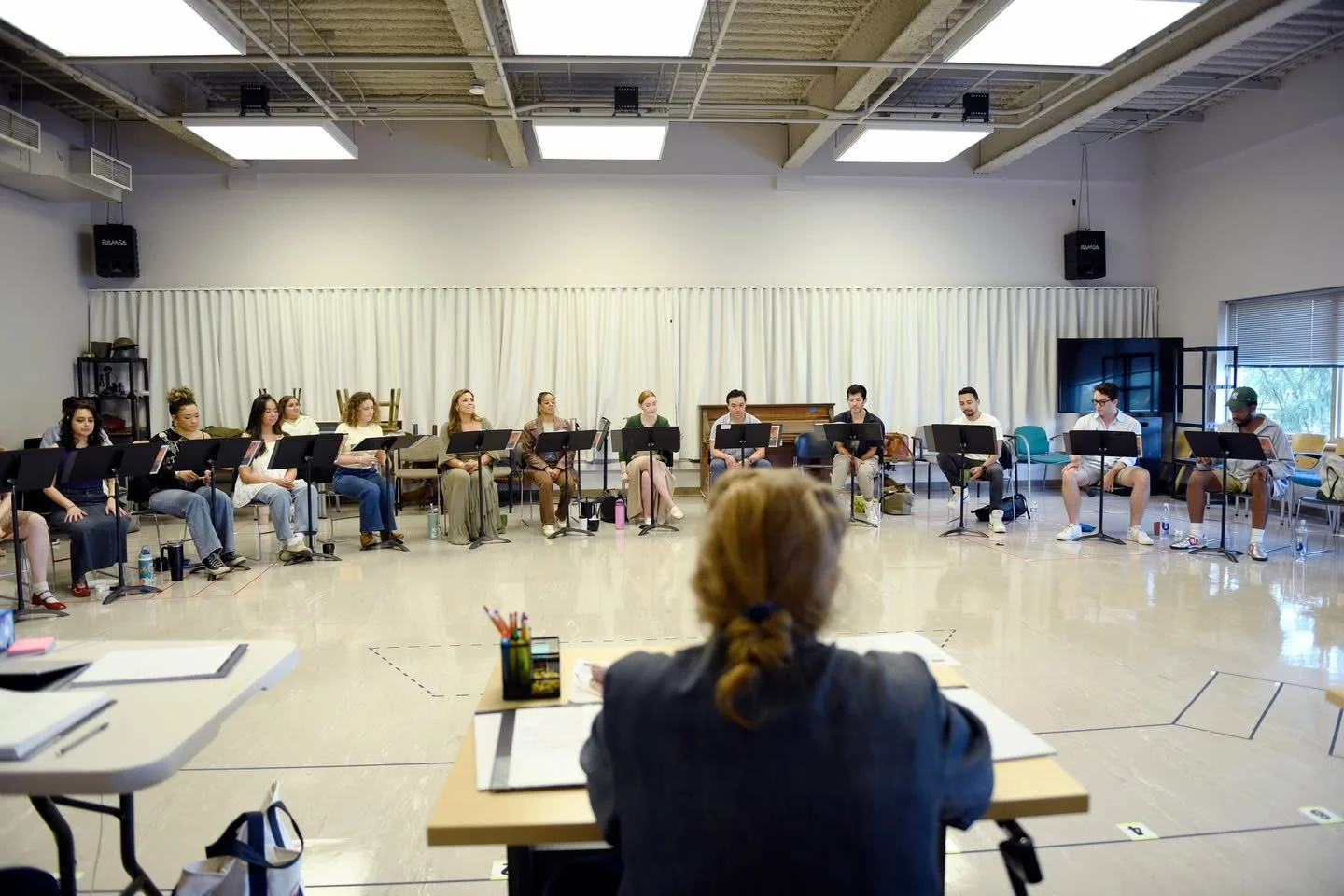AN INTERVIEW WITH PETER MILLS AND CARA REICHEL
Cara Riechel and the company of “The Hello Girls” beginning rehearsals.
AN INTERVIEW WITH PETER MILLS AND CARA REICHEL
This past May, while The Hello Girls creative team visited Syracuse Stage for a week-long workshop with Syracuse University Department of Drama students to develop the show’s choreography and other technical elements, Syracuse Stage’s publications manager Matthew Nerber sat down with Peter Mills (composer, lyricist and co-bookwriter) and Cara Reichel (director and co-bookwriter) to discuss the process of bringing this heroic musical to life.
Matthew Nerber: What was that first spark for this show, when you decided that this was the story you wanted to bring to the stage as a musical?
Cara Reichel: I think it was over Memorial Day weekend in 2015. I saw a documentary on the history of women in the military which included a short segment on the Hello Girls. At that time we were looking for possible projects that would center strong women characters and women's stories—and this one just grabbed me. It’s not only an important story, but it lived in a world that I could hear as a musical. And then I shared that with you, Peter.
Peter Mills: It was such a great story! Once you start learning the details of what the women did, you feel the injustice of their not being recognized as veterans for so long. It’s a fantastic adventure, and a war story too. We had written other musicals based on history—specifically one set rather close to this time period of WWI. So as a composer, I knew that I could do that.
MN: What was your approach for music? Was it looking at the time period with jazz, ragtime, and all that, or was there a specific composer that was an influence?
PM: Ragtime was one thing I looked at, and it ultimately made its way into the score for one particular number: “We Aren't in the Army.” I thought: What if it's a kind of slow ragtime feel? We’re so used to hearing the “Maple Leaf Rag” played at lightspeed, but Scott Joplin, on all of his ragtime pieces, said something like: “Ragtime must never be played fast.” I thought we could really lean into a slow and heavy ragtime feel that channeled the women's aggravation with the process and the bureaucracy.
I will say a lot of the other musical styles in the show that sound “old-timey” to our modern ears are actually still more modern than WWI. Something like “Je M’en Fiche” is really more swing-era type music. Irving Berlin was certainly a composer I listened to, to get into that head space—something like “Alexander's Ragtime Band,” which was the earliest start of that real Tin Pan Alley American popular song sound. But “Je M’en Fiche” is more in line with what would come out of the 1930s.
CR: And “Hello Girls,” the title song, sounds much more like World War Two—it’s more of a 1940s feel.
PM: I think sometimes we talked about this, and thought: Yes, because these women were ahead of their time and were blazing the trail.
CR: We realized fairly early on that we weren’t interested in recreating a strictly period world, because there are things you can only see when you look back over time. Our main character, Grace Banker, didn't even survive to see the end of the women’s journey for recognition, so we wanted to create a device that allowed us to give it the perspective of history. Once we made that choice, it opened up all of the languages of music in different time periods. So there are some songs that feel like more traditional musical theater, and some are more modern, pop-rock musical theater.
PM: The military element was an important one too. The idea of marches and snare drums. “Answer the Call” is a song that I really am proud of, where we landed on that. It was originally more of a traditional military march, and it felt like a period piece, evoking WWI. Now it has the feel of a ballad, but it still has that snare and military marching underpinning. I like the way it manages to live in both worlds, and feels less of any one particular time period, because it's mixing the metaphors. It works well for the top of the show, because we are mixing the contemporary frame and the history that we go back into.

